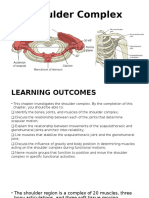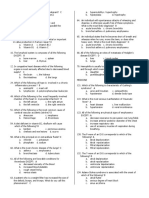PT Initial Evaluation For MS
PT Initial Evaluation For MS
Uploaded by
Karolle AlyssaCopyright:
Available Formats
PT Initial Evaluation For MS
PT Initial Evaluation For MS
Uploaded by
Karolle AlyssaOriginal Description:
Original Title
Copyright
Available Formats
Share this document
Did you find this document useful?
Is this content inappropriate?
Copyright:
Available Formats
PT Initial Evaluation For MS
PT Initial Evaluation For MS
Uploaded by
Karolle AlyssaCopyright:
Available Formats
Initial Evaluation General Information Patients Name Sex Age Civil Status Address Occupation Referring Unit Referring
Doctor Rehab Doctor Date of referral Date of Consultation Date of IE Diagnosis
: RMG : Female : 30 y/o : Married : Los Angeles, California : Nurse : General Neurology : Dr. Charles Monroe : Dr. Anthony Adams : June 13, 2013 : June 13, 2013 : June 15, 2013 : MS with laboratory support
Birthdate Handedness Nationality
: May 2, 1983 : (R) : American
HPI: Present condition started 6 months PTC when she noticed an onset of weakness in her (L) arm which was followed by subsequent numbness descending down to the (L) leg. She was able to walk normally but a few weeks later developed tingling sensation and tight band like sensation on both LE, loss of balance, and scanning speech. Pt was confined the same day and undergone laboratory examinations such as LP which revealed elevated IgG in spinal fluid, MRI that showed acute and chronic lesions in the brain and spinal cord. Neurologic examination showed optic neuritis on the (L) eye and nystagmus on the (L) lateral gaze. Family physician treated her with I. V. Solumedrol c excellent benefit, and the pt became ambulatory after 2 wks. A wk ago the pt had a dramatic neurologic decline during which she was initially unable to sit up, lost strength and sensation in her LE. Patient's family reports that she had a lot of difficulty c mood control, particularly excessive crying and laughing. She was also given oral prednisone 20 mg po qid, Maalox 1o cc po qid, Valium c very modest benefits. Pt was discharged and was referred to PT for further eval and tx. PMHx: (-) HPN (-) DM FHx: (+) HPN on both sides SHx: Has an active lifestyle and a nurse for the last 10 years; lives c husband and daughter in a 2-storey house. S: c/o: weakness on both LE and (L) UE Easy fatigability O: V.S BP: a-120/80 mmHg d- 130/80 HR: 78 bpm RR: 16 cpm Temp: afebrile to touch OI: amb c quad cane A/C/C Ectomorph
p-130/80
Palp: Normotonic in both UE and LE ROM: All jts of both UE and LE are WNL on all planes of motion except from the ff: Difference Cervical (L) shoulder (L) hip (R) hip (L) knee (R) knee Active 30 120 80 90 100 100 Passive 180 120 120 120 120 Normal 45 180 120 120 120 120 Active 60 40 30 20 20 Passive 0 0 0 0 0
Sig. LOM on AROM 2 to pain and mm weakness MMT: All mm of the UE and LE are grossly graded 5/5 except for the ff: (L) shoulder flexor 3/5 (L) hip flexor 3/5 (R) hip flexor 3/5 (L) knee flexor 4/5 (R) knee flexor 4/5 Sig. mm weakness 2 to pain and inactivity Sensory Assessment: STD: 100% sensory innervation intact Deep sensation: (+) proprioception in all body parts DTRs: biceps ++ triceps++ patella +++ Pathologic Reflexes: (+) Babinski (R) (+) Chaddock (R) (-) Hoffmann Special Test: (+) Dix Hallpike (+) Caloric Test (+) Rhomberg ADL Analysis: Eating: FIM 4 Grooming: FIM 4 Bathing: FIM 3 Dressing: FIM 4 Toileting: FIM 3 (+) kinesthesia on all 4s
Bladder management: FIM 5 Bowel management: 4 Transfer: bed, chair, w/c FIM 4 Locomotion: walking FIM 3 Locomotion: stairs FIM 2 Communication: expression FIM 5 Communication: comprehension FIM 6 Social interaction: FIM 6 Problem solving: FIM 5 Memory: FIM 5 A: Problem list 1. (L) UE, both LE weakness 2. Mm weakness toward shoulder, hip, and knee 3. ADLs c min to max assistance as to bathing, toileting, and locomotion and transfer STG: To be achieved up to 3 mo 1. Increase or maintain ROM in all jt 2. Improve sensory feedback 3. Improve mm strength 4. Improve motor control 5. Improve coordination 6. Improve function in ADL LTG: to be achieved more than 3 mo. 1. Prevent or retard the development of secondary complications 2. Maintain general health condition of the patient 3. Attain highest functional level of the patient Mx: Pt is to be treated t.i.w as out patient c the ff PT Mx: 1. Cryotheraphy x 15 min (L) shoulder, both LE 2. TENS x 15 min (L) shoulder both LE 3. US x 1.5 w/cm2 x 5 min (L) shoulder 4. AROM on all jt at all planes 5. Stretching x 15s x 4 reps (L) shoulder, both LE 6. Gentle massage surrounding jt 7. Finger ladder (11-15 steps) x 10s x 4 reps 8. Arm Ergo x 5 min, Leg Ergo x 10 min 9. PREs x 2 lbs x 10 reps both UE, PREs x 5 lbs x 10 reps both LE 10. Codmanns ex 11. Frenkels ex 12. Gait Training a. // bars b. Quad cane c. Stair climbing 13. HEP
P:
You might also like
- Soap Note Sub-Acute TkaDocument6 pagesSoap Note Sub-Acute Tkaapi-3719716000% (1)
- Physical Therapy Initial EvaluationDocument9 pagesPhysical Therapy Initial EvaluationBianca Crane100% (3)
- Musculoskeletal NPTE Prep Flashcards - QuizletDocument10 pagesMusculoskeletal NPTE Prep Flashcards - Quizletakheel ahammed100% (4)
- TeHB MST-V 09.02 DGRL EN-US 2017-11-14Document148 pagesTeHB MST-V 09.02 DGRL EN-US 2017-11-14Alfredomesac100% (1)
- Final NPTE SpinalDocument45 pagesFinal NPTE Spinaldina sharaf100% (1)
- Luca Sciortino - History of Rationalities - Ways of Thinking From Vico To Hacking and Beyond-Palgrave Macmillan (2023)Document350 pagesLuca Sciortino - History of Rationalities - Ways of Thinking From Vico To Hacking and Beyond-Palgrave Macmillan (2023)gaby21marian3712No ratings yet
- Physical Therapy Initial EvaluationDocument3 pagesPhysical Therapy Initial EvaluationkhushmitNo ratings yet
- Npte Exam TablesDocument586 pagesNpte Exam TablesarbazNo ratings yet
- '05 Sullivan B.Document36 pages'05 Sullivan B.Geo Navarro100% (1)
- Cardio Pulmonary AssessmentDocument8 pagesCardio Pulmonary AssessmentSHAIK SHABEENANo ratings yet
- 09.indiana Jones És A Bölcsek KöveDocument245 pages09.indiana Jones És A Bölcsek KöveGyörgy PappNo ratings yet
- Saint Louis Hospital of The Sacred Department of Physical Medicine and Rehabilitation Baguio City PT Initial Evaluation General InformationDocument6 pagesSaint Louis Hospital of The Sacred Department of Physical Medicine and Rehabilitation Baguio City PT Initial Evaluation General InformationJoanna EdenNo ratings yet
- Sample Initial Evaluation PhysiotherapyDocument10 pagesSample Initial Evaluation PhysiotherapyWenzy CruzNo ratings yet
- Giles and SandersDocument36 pagesGiles and SandersJohann Sebastian Cruz100% (1)
- Giles A1Document50 pagesGiles A1Wenzy Cruz100% (1)
- Giles and SandersDocument27 pagesGiles and SandersDana Ysabelle IbarraNo ratings yet
- Open and Close Packed PositionsDocument1 pageOpen and Close Packed PositionsJamaicaLabiagaNo ratings yet
- Cardiovascular Physical TherapDocument7 pagesCardiovascular Physical TherapJadie Prenio100% (5)
- Pce Suggested ReadingsDocument3 pagesPce Suggested ReadingsIshika Sharma100% (1)
- The Physical Therapy Licensure Examination Syllabus (Philippines) )Document14 pagesThe Physical Therapy Licensure Examination Syllabus (Philippines) )Xy FloresNo ratings yet
- 9-1-1969 Project Red HorseDocument128 pages9-1-1969 Project Red HorseRobert ValeNo ratings yet
- Corporate ContactsDocument44 pagesCorporate ContactsKrishan Kakkar63% (8)
- 550 Gallon Stainless Steel Ibc Center Discharge SheetDocument1 page550 Gallon Stainless Steel Ibc Center Discharge SheetGioNo ratings yet
- Initial Evaluation For PoliomyelitisDocument5 pagesInitial Evaluation For PoliomyelitisVanessa Yvonne GurtizaNo ratings yet
- Reva Frozen ShoulderDocument6 pagesReva Frozen ShoulderVincent de CastroNo ratings yet
- Ie ArthDocument10 pagesIe ArthVanessa Yvonne GurtizaNo ratings yet
- CRPDDocument8 pagesCRPDjoanna gurtizaNo ratings yet
- Initial EvaluationDocument7 pagesInitial Evaluationjoanna gurtizaNo ratings yet
- Initial Evaluation LormaDocument8 pagesInitial Evaluation LormaVanessa Yvonne GurtizaNo ratings yet
- Physical Therapy ReviewDocument4 pagesPhysical Therapy Reviewpearl042008100% (1)
- Initial Evaluation For Spinal Cord Injury: in Partial Fulfillment of The Requirements For Clin Ed 1: Case ConferenceDocument35 pagesInitial Evaluation For Spinal Cord Injury: in Partial Fulfillment of The Requirements For Clin Ed 1: Case ConferenceAnne BorelaNo ratings yet
- Physical Therapy Foundation IIDocument4 pagesPhysical Therapy Foundation IIpearl042008100% (3)
- Hypothetical IE of Traumatic Brain Injury/TBIDocument10 pagesHypothetical IE of Traumatic Brain Injury/TBIMIKEE MEDRANONo ratings yet
- College of Physical Therapy Sem2Document10 pagesCollege of Physical Therapy Sem2karen magallanesNo ratings yet
- IE Humeral Neck FractureDocument9 pagesIE Humeral Neck FractureEarll Justin N. DataNo ratings yet
- August 1999Document15 pagesAugust 1999Kennie Ramirez0% (1)
- February 1999Document15 pagesFebruary 1999Kennie RamirezNo ratings yet
- CAMP - Cervical Radic - ColladoDocument5 pagesCAMP - Cervical Radic - ColladoSergi Lee OrateNo ratings yet
- Shoulder ComplexDocument55 pagesShoulder ComplexKim VillalobosNo ratings yet
- NPTE Final Frontier - Neuro Flashcards - QuizletDocument3 pagesNPTE Final Frontier - Neuro Flashcards - Quizletdina sharafNo ratings yet
- NPTE Sullivan Exam ADocument130 pagesNPTE Sullivan Exam AMarilia Farensena100% (1)
- NPTE CArdio NotesDocument27 pagesNPTE CArdio NotesAubrey Vale SagunNo ratings yet
- Giles and Sanders PDFDocument77 pagesGiles and Sanders PDFPrinting Co100% (1)
- Interpretation: VS Are WNLDocument4 pagesInterpretation: VS Are WNLSteve ColbertNo ratings yet
- August 1996Document11 pagesAugust 1996Kennie RamirezNo ratings yet
- NpteDocument35 pagesNpteAnanth Nagaraj71% (7)
- NPTE Study TipsDocument3 pagesNPTE Study Tipsvinayman100% (3)
- GILES 100 Answer SheetDocument13 pagesGILES 100 Answer SheetJed A. MartirNo ratings yet
- Neuromuscular Physical TherapyDocument13 pagesNeuromuscular Physical Therapypearl042008100% (3)
- Neuro AssessmentDocument6 pagesNeuro Assessmentfagpatel100% (1)
- August 1998Document19 pagesAugust 1998Kennie RamirezNo ratings yet
- Rembe 1Document8 pagesRembe 1Steve Colbert100% (1)
- PGP 2015 V 11 PDFDocument10 pagesPGP 2015 V 11 PDFYadav NishaNo ratings yet
- Orthopedic Special TestsDocument12 pagesOrthopedic Special TestsKathy Lawrence100% (2)
- Pulmonary Physical Therapy RevDocument11 pagesPulmonary Physical Therapy Revpearl042008100% (3)
- Giles and SandersDocument36 pagesGiles and SandersMonica LapusNo ratings yet
- Practice Exam FINAL ENG 1Document13 pagesPractice Exam FINAL ENG 1Suvi AcesoNo ratings yet
- Giles and Sanders PDFDocument35 pagesGiles and Sanders PDFPrinting CoNo ratings yet
- Giles Set BDocument45 pagesGiles Set BPrinting Co100% (1)
- Tendon Transfers - RehabilitationDocument4 pagesTendon Transfers - RehabilitationPankaj Malik100% (4)
- Scorebuilders 3Document40 pagesScorebuilders 3DeepRamanNo ratings yet
- August 1997Document7 pagesAugust 1997Kennie Ramirez100% (2)
- Low Back Pain: General InfoDocument4 pagesLow Back Pain: General InfoErlinda RamosNo ratings yet
- Patient ParticularDocument4 pagesPatient ParticularWeng Yaw WongNo ratings yet
- CEPEEEEDocument8 pagesCEPEEEEjoanna gurtizaNo ratings yet
- TetrapareseDocument38 pagesTetraparesemariamunsriNo ratings yet
- 21st Century Literature DLL Quarter 2 Week 3Document7 pages21st Century Literature DLL Quarter 2 Week 3mylene.panimNo ratings yet
- ML Intro Types of LearningDocument13 pagesML Intro Types of LearningAbhishek karwalNo ratings yet
- Elements of Industrial Automation Week 06 NotesDocument9 pagesElements of Industrial Automation Week 06 NotesThanmay JSNo ratings yet
- 个人陈述 营销Document7 pages个人陈述 营销h6886r5g100% (1)
- Corong-Basic Color TheoryDocument21 pagesCorong-Basic Color TheoryDiosary TimbolNo ratings yet
- 1 Write The Java Program For Grading SystemDocument5 pages1 Write The Java Program For Grading Systemadisu abuhoyNo ratings yet
- Petty Cash VoucherDocument4 pagesPetty Cash VoucherUgen SparkNo ratings yet
- Secfile 393Document39 pagesSecfile 393bonnie.reid328No ratings yet
- Perturbation MethodDocument27 pagesPerturbation MethodBillyawanNo ratings yet
- NUEWTKWCVFDocument2 pagesNUEWTKWCVFShadekul Islam AkasNo ratings yet
- Natural Disasters Homework ProjectDocument4 pagesNatural Disasters Homework Projectcfmnq02p100% (1)
- Portland CementDocument88 pagesPortland CementMirosha NavaratnaNo ratings yet
- 3D Printing With SketchUp Sample ChapterDocument15 pages3D Printing With SketchUp Sample ChapterPackt PublishingNo ratings yet
- Case Study Digitising - Logistics - in - Africa - ReportDocument22 pagesCase Study Digitising - Logistics - in - Africa - ReportMuhammad Anwar HussainNo ratings yet
- CS2029-Advanced Database TechnologyDocument18 pagesCS2029-Advanced Database TechnologyShenbakesh KishoreNo ratings yet
- EM7054T-I: Product Information PacketDocument11 pagesEM7054T-I: Product Information PacketCikalong YardNo ratings yet
- Valter Bedžhot-Postanak I Razvitak Naroda 1902Document212 pagesValter Bedžhot-Postanak I Razvitak Naroda 1902GoranNo ratings yet
- Plan, Design, Automate, Operate & Optimize: Continuous IntelligenceDocument22 pagesPlan, Design, Automate, Operate & Optimize: Continuous IntelligenceRolando NoroñaNo ratings yet
- Software Engineering Related Thesis TopicsDocument5 pagesSoftware Engineering Related Thesis Topicsaflpbevnrabaqk100% (1)
- Gymnastics Lesson PlanDocument10 pagesGymnastics Lesson Planapi-486232490No ratings yet
- Paramount Maths Volume - 2 in Hindi PDFDocument277 pagesParamount Maths Volume - 2 in Hindi PDFbirladevendra2001No ratings yet
- The Impact of CASA Accounts On The NIM of Public and Private Sector BanksDocument4 pagesThe Impact of CASA Accounts On The NIM of Public and Private Sector BanksVipin RaviNo ratings yet
- RD - TI.027.E.ENG v.C01Document104 pagesRD - TI.027.E.ENG v.C01Akhil NairNo ratings yet
- 15 Apil 2021: Stsenth A 7eks The of OnDocument4 pages15 Apil 2021: Stsenth A 7eks The of OnMarisha BhattiNo ratings yet

























































































